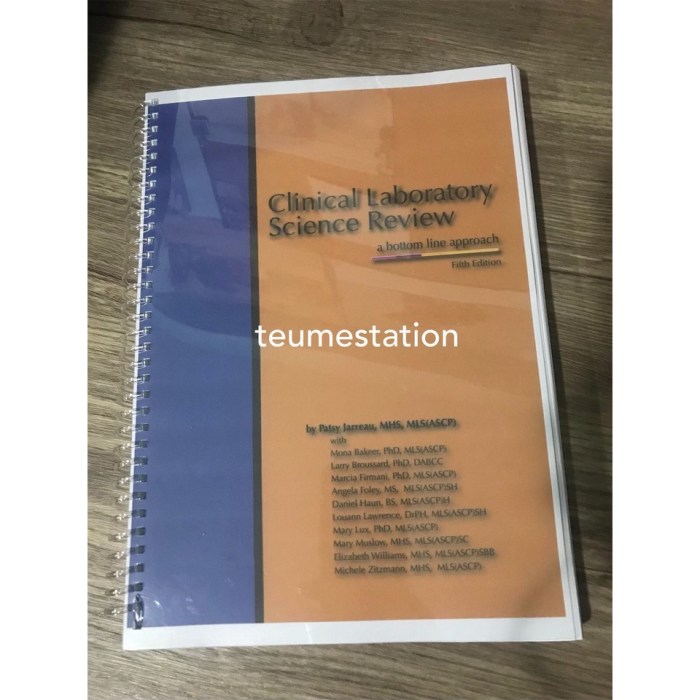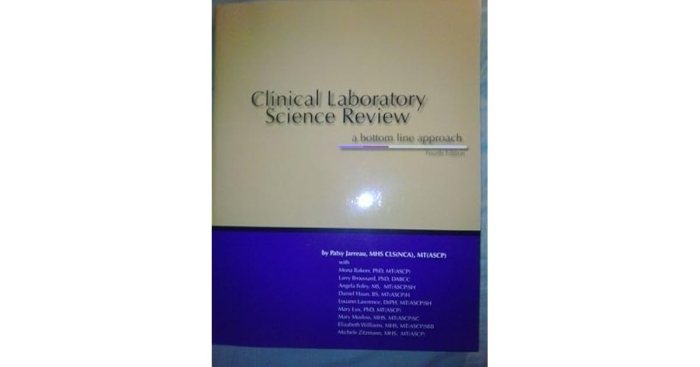Clinical laboratory science review a bottom line approach – Clinical Laboratory Science Review: A Bottom-Line Approach presents a comprehensive review of the essential principles and practices of clinical laboratory science. Written with a focus on the bottom line, this book provides a concise and practical guide to the key concepts and techniques used in the clinical laboratory.
The book is designed for students and professionals in the field of clinical laboratory science, as well as for those who wish to gain a better understanding of the role of the clinical laboratory in healthcare.
1. Introduction to Clinical Laboratory Science Review
A Bottom Line Approach

The book, “Clinical Laboratory Science Review: A Bottom Line Approach,” provides a comprehensive review of the fundamental principles and practices of clinical laboratory science. It is designed to assist students and professionals in preparing for certification examinations and to enhance their knowledge and skills in the field.
The book is targeted towards students enrolled in clinical laboratory science programs, as well as practicing laboratory professionals seeking to refresh their knowledge or prepare for advanced certifications.
The book is organized into eight chapters, each covering a specific area of clinical laboratory science. The chapters follow a logical progression, starting with basic principles and progressing to more advanced topics.
2. Basic Principles of Clinical Laboratory Science

This chapter introduces the fundamental principles of clinical laboratory science, including the role of the clinical laboratory in healthcare, the principles of laboratory testing, and the importance of quality control and quality assurance.
Types of Laboratory Tests
- Chemistry tests
- Hematology tests
- Immunology tests
- Microbiology tests
- Urinalysis
Importance of Quality Control and Quality Assurance
Quality control and quality assurance measures are essential for ensuring the accuracy and reliability of laboratory results. These measures include:
- Establishing and maintaining standard operating procedures
- Regular calibration and maintenance of equipment
- Participation in proficiency testing programs
- Internal and external audits
3. Hematology

This chapter covers the principles of hematology and its clinical applications. It includes discussions on the different types of blood cells, their functions, and the laboratory tests used to diagnose and monitor hematologic disorders.
Types of Blood Cells
- Red blood cells
- White blood cells
- Platelets
Laboratory Tests in Hematology
- Complete blood count (CBC)
- Differential white blood cell count
- Coagulation studies
- Bone marrow aspiration and biopsy
4. Clinical Chemistry

This chapter focuses on the principles of clinical chemistry and its clinical applications. It covers the different types of chemical analytes, their significance, and the laboratory tests used to diagnose and monitor metabolic and endocrine disorders.
Types of Chemical Analytes
- Electrolytes
- Enzymes
- Hormones
- Lipids
- Proteins
Laboratory Tests in Clinical Chemistry, Clinical laboratory science review a bottom line approach
- Basic metabolic panel
- Lipid profile
- Hormone assays
- Drug monitoring
Key Questions Answered: Clinical Laboratory Science Review A Bottom Line Approach
What is clinical laboratory science?
Clinical laboratory science is the study of the laboratory techniques and procedures used to diagnose and treat diseases.
What are the different types of clinical laboratory tests?
There are many different types of clinical laboratory tests, including blood tests, urine tests, and stool tests. These tests can be used to diagnose a wide range of diseases, including infections, cancer, and diabetes.
What is the role of the clinical laboratory in healthcare?
The clinical laboratory plays a vital role in healthcare by providing accurate and timely information about a patient’s health. This information can be used to diagnose and treat diseases, as well as to monitor the effectiveness of treatment.